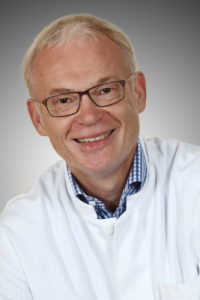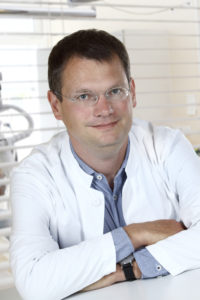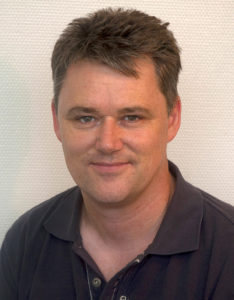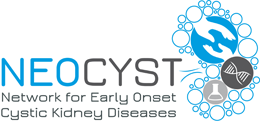 |
Hannover Medical SchoolCenter for Children’s and Adolescence Medicine Department of Paediatric Kidney, Liver and Metabolic Diseases |
Main Tasks and Objectives
- Establishing and validating a urinary proteome pattern, which enables to predict the decline of renal function in patients with cystic kidney disease
- Standardized collection of genetically defined urine-derived renal epithelial cells (UREC) from pediatric patients with cystic kidney disease
- Quantitative determination of specific cellular defects related to adhesion signaling and epithelial morphogenesis in cystic kidney disease
- Assessment of pharmacological treatment options to correct epithelial cell defects using UREC cells and further genetically defined renal epithelial cell models
Leading Investigators
 |
Prof. Dr. med. Dieter HaffnerDieter Haffner is a trained pediatric nephrologist and neonatologist. His research activities focus on the molecular pathogenesis and treatment of rare kidney diseases, e.g. polycystic kidney disease (ARPKD), hypophosphatemic rickets, and cystinosis. He is leading the Center for Rare Kidney Diseases and is management board member of the Integrated Research and Treatment Center for Transplantation (IFB-Tx) at Hannover Medical School. He coordinates the Chronic Kidney Disease – Mineral and Bone Disorders (CKD-MBD) working group of the European Society for Paediatric Nephrology and of the Lupus Nephritis working group of the German Society for Pediatric Nephrology. He is associated editor of the journal Pediatric Nephrology, council board member of the ESPN, IPNA, and member of the steering committee of the ARPKD registry. |
 |
Prof. Dr. med. Lars PapeDeputy director of the Department of Paediatric Kidney, Liver and Metabolic Diseases and head of the KfH-Department of pediatric nephrology NEOCYST – Principal investigator Project P6 Prof. Pape is pediatric nephrologist with a full professorship for pediatric nephrology. His main research focus is the development and establishment of biomarkers in pediatric nephrology as well as health services research mainly in transitional medicine and improvement of care after kidney transplantation. He is council member of the International Pediatric Transplantation Society and Director of Studies of the German Pediatric Nephrology Association as well as deputy chairman of the task force kidney transplantation of the GPN and the national pediatric health system advisor for dialysis. |
 |
Dr. rer. nat. Wolfgang H. ZieglerHead of laboratory in the Department of Paediatric Kidney, Liver and Metabolic Diseases, Paediatric Research Centre of Hannover Medical School Leading translational Project P5 Wolfgang Ziegler is a trained biochemist and cell biologist. His work is focused on biochemical and biophysical aspects of the cytoskeletal connection and related signal transduction. In pediatric nephrology, his team investigates consequences of defective renal epithelial morphogenesis and homeostasis in children with cystic kidney disease. Their quantitative, cell biological studies are based on epithelial cell models and ex vivo analysis of human renal epithelial cells in 3D culture. |
 |
Dr. med. Jens DrubeNEOCYST – Deputy Project P6 Mr. Drube works at the outpatients’ department of paediatric nephrology since 2003. His primary research focus centers on urinary proteome analysis. Selected publication: Urinary proteome analysis to exclude severe vesicoureteral reflux. Drube J, et al., Pediatrics. 2012;129:e356-63 Urinary proteome pattern in children with renal Fanconi syndrome. Drube J, et al., Nephrol Dial Transplant. 2009;24:2161-9 |
